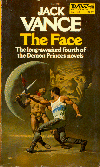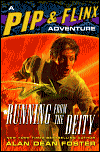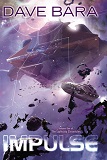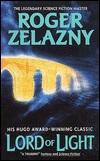
Neverness, by David Zindell
Book Review by David Hart
Have you read this book?
This was Zindell's first novel. It is noticeably long at 680 densely written pages. Though it is stand-alone, be aware that its story continues in "A Requiem for Homo Sapiens", a trilogy of equally long books; so if you like this one, you may need a new bookcase.
The action takes place some 3000 years in the future. Mankind has spread through the galaxy after destroying the Earth by nuclear wars. On the way they made a couple of other minor errors. They messed around with the DNA of bacteria, accidentally creating an group-entity of intelligent bacteria that has taken over a whole star-cluster; and with the DNA of themselves, creating some altered races with strange abilities, and some so altered as to be no longer human. The other error was in creating what are referred to in the book as "gods". The first few times these were mentioned, I wondered if Zindell was introducing a fantasy element into the book. But then it became clear that this is divinity only in the "sufficiently advanced technology" sense: a god is "merely" a very intelligent, self-aware computer (perhaps running Windows 5000, the version with intelligent bugs).
Neverness is the name of the city in which is based the guild of space-pilots and associated professions. It was built where it is because its frozen planet lies within an area of "thickspace", meaning a region where mathematical connections between stars happen to be clustered thickly. A pilot is an applied-mathematician who can link to his ship's computer, and thus augmented can solve the equations and prove the theorems of space-travel -- in fact I think Zindell is implying that it is these mathematical solutions that cause space to be traversed. The pilots are supported by many others: pure mathematicians (cantors), surgeons (cutters), engineers (tinkers), scryers who can see futures, remembrancers who look in the other direction, cetics who can "read" people by observing their expressions and muscle movements; and many more.
To summarise the good points of the book, Zindell has composed a detailed and self-consistent future history (of which I have mentioned only part), and manages to give the impression that there is more still beneath the surface. This scenario is gradually revealed during the book in a well-controlled way which keeps the reader's interest while avoiding sudden deluges of novelty (especially important when so many professions are confusingly renamed). I found novel and intriguing the descriptions of the interactions between the pilot and the mathematical universe during space travel. And finally, the plot threads come together satisfyingly at the end.
And now the less-good points. This is not a book that depends greatly on heavyweight plotting. In fact, although there are digressions of varying degrees of interest, the main storyline is sufficiently simple that to describe it would spoil the book for the potential reader; which is why I haven't. Next the writing. Though certainly not bad, this does have its problems. The story is narrated in the first person by the hero, Mallory, of whom more below. Since he spends considerable parts of the book alone, this sometimes results in very long paragraphs of description or introspection unleavened by dialogue; and this is exacerbated (at least in my edition) by the small print-size. In consequence I found the words tended to go in one eye and out the other, and these bits of the book don't exactly qualify as page-turners. (Other parts could be described as page-turnbackers, as I tried desperately to remind myself what a remembrancer is, or an eschatologist or a holist or an akashic or....)
Then there is the characterisation. The good news is that each main character is distinctively and thoroughly drawn. The bad news is that they stay that way. Mallory's friend Bardo remains a Falstaffian buffoon, always calling Mallory "Little Fellow". Katharine, the love-interest scryer, who always calls him "sweet Mallory", is consistently vacuous, and never completes her sentences. But worst is Mallory himself because we are trapped within his head by the first-person narrative. And he is not an entirely likeable individual: being, as he freely admits to us, arrogant and impulsive with a violent streak; and remains so.
Finally, the novel's structure. It would have been immensely beneficial to the book if 200 pages in the middle had been left out. This section describes an excursion to another part of the planet to take samples from the Alaloi, a people whose forebears had chosen to mutate themselves back to Neanderthals and downshift to a low-tech, Inuit-style life. The reason Zindell inserted the section is presumably that Neverness is the sequel to a short story about the Alaloi, and we meet here one of the characters from that story. While this is understandable, the episode turns out to be a long and tedious wild goose chase in terms of the plot, and it would have been kinder both to the characters and the reader had it been omitted.
Nevertheless, don't be put off. Lovers of hardish, intricate, galaxy-spanning science fiction will enjoy the book for the future history alone; and, the above quibbles aside, the plot takes you through interesting parts of that future to a satisfying ending. Though a flawed masterpiece, it is one well worth reading.
The action takes place some 3000 years in the future. Mankind has spread through the galaxy after destroying the Earth by nuclear wars. On the way they made a couple of other minor errors. They messed around with the DNA of bacteria, accidentally creating an group-entity of intelligent bacteria that has taken over a whole star-cluster; and with the DNA of themselves, creating some altered races with strange abilities, and some so altered as to be no longer human. The other error was in creating what are referred to in the book as "gods". The first few times these were mentioned, I wondered if Zindell was introducing a fantasy element into the book. But then it became clear that this is divinity only in the "sufficiently advanced technology" sense: a god is "merely" a very intelligent, self-aware computer (perhaps running Windows 5000, the version with intelligent bugs).
Neverness is the name of the city in which is based the guild of space-pilots and associated professions. It was built where it is because its frozen planet lies within an area of "thickspace", meaning a region where mathematical connections between stars happen to be clustered thickly. A pilot is an applied-mathematician who can link to his ship's computer, and thus augmented can solve the equations and prove the theorems of space-travel -- in fact I think Zindell is implying that it is these mathematical solutions that cause space to be traversed. The pilots are supported by many others: pure mathematicians (cantors), surgeons (cutters), engineers (tinkers), scryers who can see futures, remembrancers who look in the other direction, cetics who can "read" people by observing their expressions and muscle movements; and many more.
To summarise the good points of the book, Zindell has composed a detailed and self-consistent future history (of which I have mentioned only part), and manages to give the impression that there is more still beneath the surface. This scenario is gradually revealed during the book in a well-controlled way which keeps the reader's interest while avoiding sudden deluges of novelty (especially important when so many professions are confusingly renamed). I found novel and intriguing the descriptions of the interactions between the pilot and the mathematical universe during space travel. And finally, the plot threads come together satisfyingly at the end.
And now the less-good points. This is not a book that depends greatly on heavyweight plotting. In fact, although there are digressions of varying degrees of interest, the main storyline is sufficiently simple that to describe it would spoil the book for the potential reader; which is why I haven't. Next the writing. Though certainly not bad, this does have its problems. The story is narrated in the first person by the hero, Mallory, of whom more below. Since he spends considerable parts of the book alone, this sometimes results in very long paragraphs of description or introspection unleavened by dialogue; and this is exacerbated (at least in my edition) by the small print-size. In consequence I found the words tended to go in one eye and out the other, and these bits of the book don't exactly qualify as page-turners. (Other parts could be described as page-turnbackers, as I tried desperately to remind myself what a remembrancer is, or an eschatologist or a holist or an akashic or....)
Then there is the characterisation. The good news is that each main character is distinctively and thoroughly drawn. The bad news is that they stay that way. Mallory's friend Bardo remains a Falstaffian buffoon, always calling Mallory "Little Fellow". Katharine, the love-interest scryer, who always calls him "sweet Mallory", is consistently vacuous, and never completes her sentences. But worst is Mallory himself because we are trapped within his head by the first-person narrative. And he is not an entirely likeable individual: being, as he freely admits to us, arrogant and impulsive with a violent streak; and remains so.
Finally, the novel's structure. It would have been immensely beneficial to the book if 200 pages in the middle had been left out. This section describes an excursion to another part of the planet to take samples from the Alaloi, a people whose forebears had chosen to mutate themselves back to Neanderthals and downshift to a low-tech, Inuit-style life. The reason Zindell inserted the section is presumably that Neverness is the sequel to a short story about the Alaloi, and we meet here one of the characters from that story. While this is understandable, the episode turns out to be a long and tedious wild goose chase in terms of the plot, and it would have been kinder both to the characters and the reader had it been omitted.
Nevertheless, don't be put off. Lovers of hardish, intricate, galaxy-spanning science fiction will enjoy the book for the future history alone; and, the above quibbles aside, the plot takes you through interesting parts of that future to a satisfying ending. Though a flawed masterpiece, it is one well worth reading.
| Neverness, by David Zindell on Amazon |
Neverness, by David Zindell on Amazon

Comment on Neverness, by David Zindell
| Comments on Neverness, by David Zindell |
| There are no comments on this book. |




